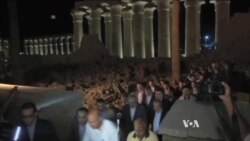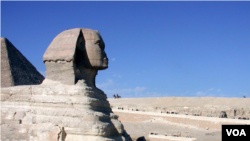Egyptian Prime Minister Ibrahim Mahlab on Thursday visited an ancient temple site in Luxor, which was targeted by a suicide bomber earlier this week, saying security forces are doing everything possible to keep tourists safe.
Taking a nighttime tour of all the major temple complexes, Mahlab urged international solidarity to fight terrorism while seeking to reassure tourists that the country's ancient sites are safe.
"It shows that any place in the world is 100% safe? No place in the world is 100% safe," he said. "Without real solidarity, no place is safe, no place in the world, but we are taking all measures, everything is controlled and now it is a question of international solidarity against terrorism."
Wednesday’s attack targeted the 4,000-year-old Karnak temple, where a bomber blew himself up before entering the complex. One gunman was shot and another captured, while four people, including two policemen, were wounded.
Earlier this month two police officers were shot dead on a road near the pyramids at Giza, not far from Cairo.
The number of tourists visiting Egypt has fallen by at least a third since the 2011 Arab Spring — but had been slowly recovering in recent months. Despite the Luxor attack, tourists have returned to the Karnak temple in recent days.
“We still came to Karnak because these sorts of things happen and the police took care of it," William Pace, a U.S. tourist, said. "Same things happen in the United States and it does not keep me from going to cities there. ... Things happen, violence happens around the world. You can't, you know, be afraid.”
Tourists in Egypt ave been targeted in the past. In 1997, suspected Islamist extremists killed 59 visitors, most of them foreigners, also in Luxor.
In recent years, Islamist militants in the Sinai Peninsula — previously known as Ansar Bait al-Maqdis — have launched attacks on government targets. In early 2014, they claimed responsibility for an attack on a tourist bus in Sinai in which three South Koreans and the Egyptian bus driver were killed.
But in the year since, the militants' focus remained on government and security targets, even as they proclaimed their allegiance to the self-styled Islamic State. Tobias Borck of the Royal United Services Institute says the Luxor attack suggests their goals may be shifting.
“Speculation will be whether this means that the radicals are adopting new tactics, are taking a different approach, feeling like they’re not quite getting to where they want to get by just attacking the security forces," said Borck. "An option also is that this is a different kind of group with a different kind of agenda.”
The 2013 army overthrow of Morsi, Egypt's first freely elected civilian president, was initially seen as a crackdown on the Muslim Brotherhood, which the government frequently conflated with jihadists.
Borck says this is fueling the Islamist insurgency.
“The government of President Sissi [the former army chief who ousted Morsi] is engaged in a massive crackdown on all forms of political dissent in Egypt at the moment," said Borck. "That does not mean that this is an attack carried out by the Muslim Brotherhood.”
But tensions are rising among supporters of the 87-year old association, the oldest and most organized political group in Egypt. Former president Morsi was given a provisional death sentence last month for his role in a 2011 prison break during the anti-Mubarak uprising.
The final verdict is due June 16.
His supporters have warned of a huge backlash if the death sentence is confirmed.







